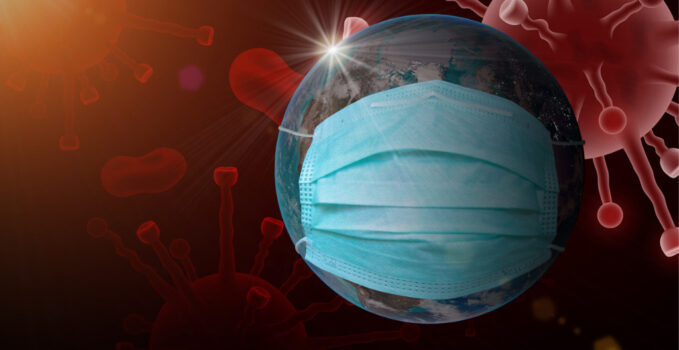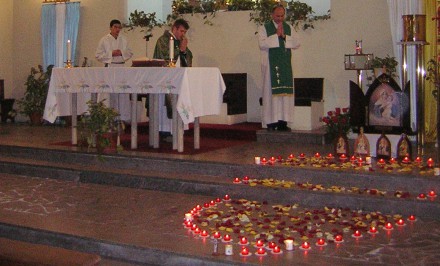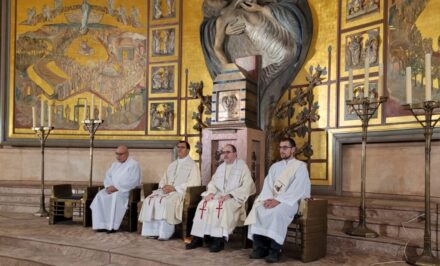Letter from the Bishop of the Diocese of Encarnación, + Francisco Javier Pistilli Scorzara, Schoenstatt Father •
Dear priests, consecrated persons, and the faithful of our Diocese: Yesterday was a very exhausting day for the medical workers at the Encarnación Respiratory Center due to the increased number of cases requiring attention. This situation that worries us and affects us all is happening during the month of May. —
 We want to be the light of accompaniment in the pandemic. Encouraged by faith and trust in God to whom we entrust our anguish, skepticism, defeatism, or angry reactions – verbal or otherwise. The light of Christ accompanies us throughout the pandemic and it is our Christian mission to help this light shine at all times.
We want to be the light of accompaniment in the pandemic. Encouraged by faith and trust in God to whom we entrust our anguish, skepticism, defeatism, or angry reactions – verbal or otherwise. The light of Christ accompanies us throughout the pandemic and it is our Christian mission to help this light shine at all times.
What can we do to help in a positive way?
Moved by our love for Christ and neighbor and through the commitment to safeguard one another for the good of life and health, it is important and necessary for all of us to be part of the solution and try not to be part of the problem. We are one Body, as our faith teaches us. We must act in this pastoral unity. I am, therefore, writing to offer criteria and guidance with the invitation to maintain and encourage everyone in the Christian mission that has been given to each of us.
COVID-19 is a serious disease
Firstly, it is important to speak clearly: COVID-19 is a serious disease; it is not a simple cold. Hiding this from people deprives them of the opportunity to react in a timely and appropriate manner and exposes them to serious consequences in the progression of this sickness. Those who experience symptoms must report to a care facility, consult with the doctors and begin the required treatment. Do not give bad information.
Preventive measures
Secondly, we must also say very clearly: The medical interventions must be accompanied by strict adherences to the preventive measures. Medical measures are those that are given to patients who present symptoms when they arrive at medical facilities or the hospital. Preventive measures are taken before that to prevent contagion and the spread of the virus in the community. If we relax the preventive measures, the health system will be overwhelmed and will collapse.
Paying attention to the degree of individual exposure is an act of responsibility
Thirdly, and realistically, we must say: Those who are careless not only expose themselves but also expose their family, work and friendships groups, and beyond. Exposure is: not wearing a mask, not sanitizing, not maintaining social distance in shared public and private spaces, not limiting the number of essential contacts. Paying attention to the degree of individual exposure is an act of responsibility that each one should observe, for his own well-being, the well-being of his loved ones, and everyone.
Specific treatment of this disease relies on the vaccine
Fourthly, there is a responsibility to provide information with rigor: The specific treatment of this disease relies on the vaccine to strengthen immunity and a collection of actions and known medicines to sustain the patient, avoid damage to vital organs, and help to treat the consequences of the infection. The efficacy of this treatment is not 100% perfect, but if it is administered in a timely and correct way, it promises a good chance of recovery. It is not responsible to encourage people to adopt experimental treatments, while excluding specific treatment, or alternative treatments that do not offer guarantees or are harmful.
Complexity of the pandemic
In fifth place, we recall that this virus, due to its highly contagious nature, constitutes a pandemic, which means that it is not a simple problem, but is complex. Measures taken must also respond to the complexity of the pandemic. The expression of this complexity is, for example, the effects on the economy and social relations, increased domestic violence, educational difficulties, to name just a few.
Be the light accompanying this journey
In light of these circumstances and seeing that we all need to be “the light accompanying this journey, I urge each parish, in its pastoral activities and its movements, to take into account what I have already pointed out with the following guidance:
- Develop a more human form of communication that is more empathetic, that promotes preventive actions, and effective, educational, and informative solidarity. Humanizing communication recognizes that it is not about numbers but about people we know and love, and that everybody’s life is important. Empathizing in our communication is to place ourselves in the shoes of the sick, of those who suffer, the health workers, the difficulties of teachers, students, families with limited resources and the community as a unit where we all need to unite our efforts. Our communication should sustain faith, prayer, and the correct and necessary actions and obligations. Let use the resources and means at our disposal: community radios, social media, and other means of communication in a positive way. Let us equip ourselves to be communicators of hope and responsibility.
- Supporteffective actions to help manage the required resources. The public administration of health by means of medicine, vaccines, personnel, beds, and supplies is the responsibility of the health facilities and the State. Solidarity is something that we all strive for as citizens but at the same time, we can collaborate in many ways with those who are most in need. Let us be subsidiaries where there are no resources and let us unite efforts to support the affected people and families.
- Observe the restrictive measures regarding the number of participants at religious activities and in holding social events and meetings. This is the “firebreak” at community level to avoid the spread of the virus. Let us also promote a reduction in the number of gatherings in which each person must, in good conscience, participate. The alternative use of telecommunications resources and social media allows meetings to go ahead without risky physical gatherings. Wisdom is knowing how to choose the gatherings that are truly necessary. Let us avoid large crowds of people.
- Ensure that the necessary sanitization protocols are in place in churches, schools and colleges, and other church-based spaces. It is good to invest in these, because we must think that hand basins are not only for this time of pandemic but will always be necessary in appropriate places and accessible in our buildings and meeting spaces.
- Inform our parishioners and the entire community adequately, with responsible, necessary, and timely information. Let us avoid fueling disappointment and fear with catastrophic views of reality and let us always act with perseverance, a sense of community, unity, belonging, the ability to face times of difficulty together, and finding solutions.
- Take advantage of places where we are at the service of education and formation. Schools and colleges, and the university can hold workshops about the COVID-19 pandemic, examine the local pandemic situation, promote specific local actions in places where there are increased cases, and commit the educational community to finding solutions. In our catechesis, we can also focus some of our meetings on this issue, as part of the entire Christian commitment to the common good. We must education correctly, create personal and community awareness, discern correct actions, enact necessary and timely actions to prevent spreading the virus and reducing community transmission, and create healthy spaces and promote a healthy culture.
- May all those who are responsible for parishes, movements, chapels, schools and colleges, the university, watch over their neighborhoods and communities, helping families and people to raise their spirits and not become discouraged, to feel committed to a solution and the end of the pandemic, to avoid unsafe activities, to care for those who are affected in a timely and appropriate way.
- May all our communications and actions aim not only to put an end to the pandemic but also contribute to the fundamental good that we trust each other and help each other, working together, with common criteria, with a positive, effective, harmonious communication, in a way that expresses love of neighbor, life, and health. Prayer should emerge from our deep communion with the Body of Christ and everything we say, plan, and do should be directed to Christ.
- May we supportspiritually the families who have lost loved ones, that they feel comforted through prayer and our respectful closeness. May the wounds of the sudden goodbyes of those we love be healed, knowing that we are not alone and that our deceased brothers and sisters are remembered in the community in our common prayer.
- May we learneach day and let us not tire of improving our personal, family, social, working, educational and church relations. May we always know how to find strength in adversity so that we can be better people and better Christians.
Even though the road seems long, for us, as Christians, the Way is Christ who tells us that each day has its worries and its efforts. Let us live each day with faith and love, as the Lord’s disciples.
In the daily Eucharist I remember you all, offering you in Christ as an offering for the lives of all. Receive my blessing, persevere in prayer. May the Blessed Mother and St. Joseph protect you.
Encarnación, 20 May 2021
+ Francisco Javier Pistilli Scorzara, Schoenstatt Father
Bishop
Original: Spanish. Translation: Sarah-Leah Pimentel, Cape Town, South Africa














